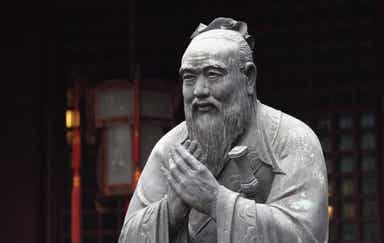
Confucius was a Chinese philosopher who lived at a time when war and confusion ruled. However, he never gave up in his search for a way to overcome difficulties with knowledge. When he was 50 years old, he started traveling through China. On his travels he shares his thoughts, especially in the form of aphorisms. His influence was so great that he soon began filling entire auditoriums with listeners. Even politicians and influential men engaged with his thoughts and put them into practice.
If you want to be wise, learn to ask appropriately, to listen thoughtfully, to answer calmly, and to be quiet when you have nothing to say.
Confucius' ideas revolved around education as the source of virtue. He proposed three fundamental virtues: Goodness, which leads to joy and inner peace; Science, which dispels doubt; and Courage, which puts all kinds of fear to flight. Below we will share with you some of Confucius' quotes that are still relevant.
Confucius' ideas of a wise life
Much of Confucius' philosophy revolves around developing certain virtues and attaining wisdom for a more fulfilling life. In his thoughts you can recognize a tolerant person to whom reflection and moderate behavior are important. This is also reflected in the following ideas:
"A little money avoids problems; a lot of money attracts them."
"Everything has its own beauty, but not everyone can see it"."
"If the goal seems hard to reach, don't change course; look for a new way to get there."
"Going too far is not as bad as not going far enough."
"He who is master of his anger is master of his worst enemy."
"It is better to light a candle than to curse the darkness."
"Music brings a certain pleasure without which human nature could not be sustained."
"Revenge perpetuates hatred."
"Vices come as passengers, visit as guests, and stay as masters."
"Never bet. If you know that you will defeat the other person, then you are a deceiver… and if you do not know, then you are a fool."
Coherence, the test of virtue
In Confucius' thought, there are many allusions to the importance of consistency between the way you think, feel, and act. He attributed a special importance to actions, because, in his opinion, they brought out the true validity of the words. He rejected artificial attitudes and emphasized simplicity.
"A superior man is humble when he speaks, but generous when he acts."
"Articulated speech and flattery very seldom go hand in hand with virtue."
"The most sublime kind of person is the one who acts before he speaks, and carries out what he preaches."
"To know justice and not act on it is cowardice."
"Just as water takes the form of its container, a wise man must adapt to circumstances."
"Give a man a fish and he will eat of it for a day. Teach him to fish and he will eat for the rest of his life."
"Wisdom strives to be slow in her speeches and exact in her actions."
"Only the wisest sages and the most foolish fools are incomprehensible."
Interact with others
In Confucius' philosophy, there are many reflections that relate to how relationships between people can work: Respect must be the basis of any society and generosity is a very high good that makes everyone who applies it happy. Confucius supported the idea of judging others in a kind and harmonious manner.
"He who strives to secure the well-being of another has already secured his own."
"Demand much of yourself and very little of others. So you save yourself a lot of discomfort."
"Nature makes men equal and causes them to approach one another. Education makes us different and makes us move away from each other."
"Human nature is good and evil is essentially unnatural."
'What the wise man wants, he seeks within himself'. What the common man wants, he seeks in others."
" The faults of a person always match the nature of his mind. Observe his faults and you will know his virtues."
"Youths and servants are the most difficult people to deal with. If you are casual with them, they become disrespectful; if you build up distance to them, they resent it."
"Do not reply to a word said angrily in the same tone of voice. It is the second, yours, that will otherwise guide you safely into battle."
Knowledge
Education and knowledge are essential components of Confucius' philosophy. This thinker truly believed that people are good by nature. But this human nature must be cultivated and molded so that it may be best expressed, he said. Let knowledge be a sure way to attain virtue, and virtue bring with it inner peace and happiness.
The following aphorisms reflect thoughts on this subject:
"He who knows how much is enough will always have a lot."
"A good leader always knows what is true. A bad leader knows what is easy to sell."
"A man who has made a mistake and does not correct it will make another, even greater mistake."
"He who has learned the truth in the morning can now die at sunset."
"The noblest type of person has an open mind that is free from prejudice. A less noble type of person possesses prejudice and lacks an open mind."
"There are three ways that lead to wisdom: Imitation, which is the easiest way; deliberation, which is the noblest way; and experience, which is the bitterest way."
"Ignorance is the night of the mind, but a night without moon and stars."
Tell us which is your favorite thought from this ancient and yet so modern thinker!
The contents of Gedankenwelt are for informational and educational purposes only. They are not a substitute for professional diagnosis, advice or treatment. If you have concerns or questions, it is best to consult an expert you trust.